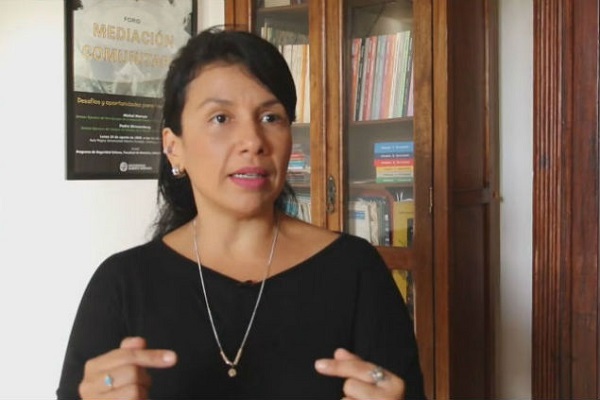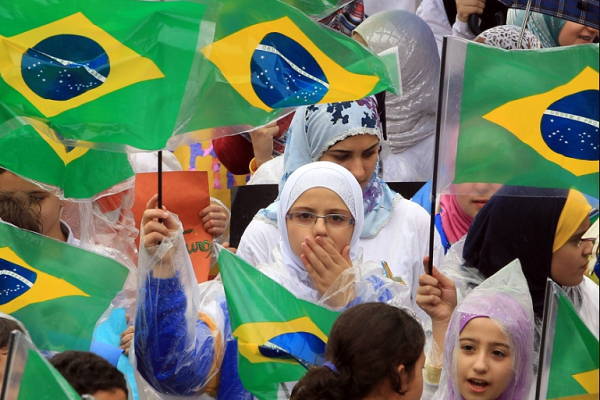TEHRAN (IQNA) – A Brazilian sociologist says the debate on religious freedom has been “very intense” in current election campaigns, signaling the increasing role of religion.

Brazil's presidential election, which was held on October 2, was extended to a second round because none of the candidates could win the majority, and the second round of these elections is scheduled for October 30 between Lula da Silva (former president) and Jair Bolsonaro (current president) to be held.
Many countries are closely following the political developments of the world's fourth largest economy, and it seems that the votes of religious and racial minorities in Brazil are very important for the presidential candidates of the largest South American country.
Christina Vital da Cunha, a Professor at the Department of Sociology of Fluminense Federal University, believes that religious debates have been raised by both candidates more than in the 2018 elections, and it seems that there is a divide in Brazilian society will become deeper after the election.
She spoke with IQNA about the Brazilian elections and the role of Muslims and religion:
IQNA: How is this year’s presidential election in Brazil different from previous elections?
Vital da Cunha: The first difference from the elections in 2018 is that the main competitor of Jair Bolsonaro is running in the elections and came out in first place in the first round. Social and economic conditions in Brazil are more serious due to Bolsonaro's management over these four years at the helm of the presidency and also as a result of the pandemic and the international economic challenge.
The public debate is being guided by moral and religious issues brought up strongly by Jair Bolsonaro's campaign that uses religious language as a political language, a way of communicating with the population using Christian grammar, above all, Pentecostal. The big themes such as fighting hunger, fighting corruption, plans for national development, education were in the background in the presidential campaign.
Lula introduced these themes, as well as the two other candidates who came in third and fourth place respectively: Simone Tebet (MDB) and Ciro Gomes (PDT). The rhetoric of loss, a category I used to refer to an important narrative in the 2018 elections mobilized by Bolsonaro's candidacy and by other victors in that election, was also used in 2022.
The most conservative say that traditions, customs and religion Christians are under threat and the election of Bolsonaro and other conservative candidates in right-wing parties are important to reverse the threats that the left would pose to family, customs and national traditions.
IQNA: During Bolsonaro’s presidency, we saw his comments and actions that strongly resembled the actions of his American counterpart,Donald Trump. How does Bolsonaro's government view racial and religious minorities in Brazil, such as Muslims?
Vital da Cunha: Bolsonaro was inspired by many behaviors of Donald Trump. This was notorious in 2018, during his government and now in the 2022 elections. Bolsonaro defends a conception anchored in a distorted vision of liberal democracy in which minorities must surrender to the majorities. In this way, it affirms that the national majority is Christian and therefore the Afro-religious must submit. They must be respected, but submit to this place of “moral minority”. This way of thinking makes the production of public policies for these groups unfeasible. Regarding Muslims, Muslim elites, as well as Jews in Brazil, supported Bolsonaro in 2018 and in 2022.
However, in terms of international relations, he spoke in an Islamophobic manner in that he stated that Brazil was ready to receive Taliban refugees, “but only Christians”, he said during his participation in the UN General Assembly. Analysts said this stance demonstrated partly religious intolerance, partly prejudice towards the poorest population. During his administration, in different situations he said that Brazil was experiencing Christophobia and referred to Christian persecution in countries in the Middle East and China to reinforce his narrative. At the same time, he carried out a commercial and diplomatic agenda with some Muslim leaders, as well as patting and waving the part of the Muslim community linked to agribusiness in Brazil. That is, in general it is against minorities, but in favor of power groups and national and international elites.

IQNA: Brazil is a religiously diverse country. What is the current situation of Brazilian Muslims in this country and how Much influence do you think this minority can have in this year’s Brazilian presidential elections?
Vital da Cunha: According to data from the Federation of Muslim Associations in Brazil, there are 90 mosques and prayer rooms in the country, more than 80 Islamic centers and almost two million Muslims (among people of Arab origin and Brazilians converted to Islam). Muslims in Brazil have great importance in the national culture and economy. In agribusiness, the most important sector of the national economy today, there is an important presence of the Islamic community. While Muslims are a minority population, having a strong presence in the economic sector (trade and agribusiness), Bolsonaro and the Christian leaders who follow him maintain cordial and, in some cases, friendly relations. If Muslims start to dispute spaces of political power, then it can no longer be said that the relations will be the same.
IQNA: Is there Islamophobia in Brazil as strongly as in Europe and America?
Vital da Cunha: Not. In general, Brazilian society highly values Arab/Muslim culture, arts, cuisine, literature and intellectuality. It is also known in Brazil, especially among scholars, thinkers and members and sympathizers of the national left, the pro-Palestinian position in the conflicts with Israel. The Bolsonaro government has inaugurated national support for Israel, but, even so, it has failed to promote any concrete action in relation to Israel, such as the issue of moving the Brazilian Embassy to Jerusalem.
IQNA: How do other Brazilian presidential candidates look at social issues such as the rights of religious and social minorities such as Muslims?
Vital da Cunha: The debate on religious freedom in Brazil has been very intense in these elections. Bolsonaro accuses Lula of being against evangelical churches. Many fake news circulated about this and Lula's campaign began to publicize the various actions in favor of religious freedom and even of evangelicals that the former president did. It instituted the Evangelical Day, signed the Religious Freedom law, constituted groups for religious diversity within the federal government (including Islamic leaders), decreed the national day to combat Religious Intolerance in 2007. The various actions to combat religious intolerance in national and state level had the important participation of the Islamic community.
IQNA: How do you predict the results of this year;s presidential election in Brazil?
Vital da Cunha: It is possible that Lula will win the elections in 2022. He came out of the first round in first place and has remained so in the polls. However, the victory must not be wide over the opponent. In the event of Lula's defeat, we also imagine that it is by a small margin, which demonstrates the division of Brazilian society as never before seen in our history in such a radical and violent way.
Interview by Mohammad Hassan Goodarzi

No comments:
Post a Comment